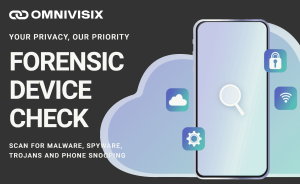🚨 SmartphoneSecurity Alert 🚨

Recent reports show just how vulnerable our phones are to cyberthreats. From spyware to bankingtrojans, these threats can hide in plain sight — stealing data, recording screens, and even hijacking bankaccounts.
🔹 LianSpy Spyware: This dangerous app disguises itself on Android devices to secretly track activities, record screens, and access personal information. It often hides as a system or finance app, making it hard to detect. Experts recommend downloading apps only from trusted sources and regularly checking app permissions.
🔹 Anatsa Banking Trojan: Masquerading as innocent apps like PDF viewers or QRcode scanners, this trojan can fully take over your device, making unauthorized bank transactions without your knowledge. If suspicious, remove the app immediately or consider a factoryreset.
StaySafe 🛡️ — Regularly check your phone for unusual activity and be mindful of the apps you install. With just a few precautions, you can protect yourself from these hidden threats.
#CyberSecurity #SmartphoneSafety #StayAlert #TechTips #MobileSecurity #DataProtection #PrivacyMatters #Omnivisix
EU’s Chat Control: Mass Surveillance Threatens Privacy for All – How Client-Side Scanning and Disclosure Orders Risk Abuse by Authorities
The EU’s pro posal for chatcontrol resurfaced after the summer break, reigniting debates about privacy and surveillance. At the core is the plan to implement ClientSideScanning of encrypted messages, raising concerns about mass surveillance. This technology would scan messages directly on users’ devices before they are encrypted, aiming to detect illegal content like child exploitation. However, critics argue that this undermines end-to-end encryption, effectively creating backdoors for government surveillance.
posal for chatcontrol resurfaced after the summer break, reigniting debates about privacy and surveillance. At the core is the plan to implement ClientSideScanning of encrypted messages, raising concerns about mass surveillance. This technology would scan messages directly on users’ devices before they are encrypted, aiming to detect illegal content like child exploitation. However, critics argue that this undermines end-to-end encryption, effectively creating backdoors for government surveillance.
Disclosure orders would require tech companies to hand over user data to authorities, bypassing traditional checks and balances. The combination of these measures is seen as a direct threat to fundamental rights, such as the right to privacy and freedom of expression, as it allows for unprecedented access to personal data without adequate oversight.
These developments raise questions about how far governments should go in surveillance and whether the need for security justifies such a broad infringement on individual liberties.
The proposed client-side scanning and disclosure orders have significant implications for ordinary people. For regular users, these measures could lead to the scanning of all private communications, regardless of suspicion. Although intended to prevent crime, this system risks normalizing #massSurveillance, compromising privacy even for law-abiding citizens.
Worse, the potential for abuse by authorities is real. Governments could misuse these powers to target political dissidents, journalists, or activists, using the broad surveillance capabilities to monitor any individual without proper oversight or justification. This undermines fundamental freedoms like privacy and expression, fostering a climate of mistrust and control. Scan your mobile
Telegram: A Gateway for Criminal Activity Now Cooperating with Law Enforcement
For years, Telegram has been a platform where criminal activities have flourished in the shadows. The app’s encrypted channels have been notoriously used for sharing illegal content, ranging from child exploitation material and pornography—including the infamous “Bible” featuring explicit images of minors—to cybercrime, drug trafficking, terrorism, and even warfare. Criminals exploited Telegram’s reputation for privacy and security, creating an underworld where malicious actors thrived unchecked.
These dark channels were linked to dangerous activities such as malware-as-a-service, where cybercriminals rented out sophisticated malware to attack individuals and businesses alike. However, our advanced forensic device scanner has consistently identified these threats, safeguarding users by detecting and warning against ser vers linked to Telegram’s illicit activity.
vers linked to Telegram’s illicit activity.
Our forensic scanner, designed to detect connections to these malicious networks, has long warned users of the dangers associated with Telegram’s less-publicized channels. Now, with law enforcement in the mix, it’s more important than ever to stay vigilant and ensure your devices are secure. Whether you’re a high-profile individual or someone concerned about privacy, the hidden threats on platforms like Telegram are real—and our scanner continues to offer the protection you need. Check out here
Protect Your Phone in an Increasingly Dangerous World: Why Our Forensic Device Check is a Must
In light of recent well-known events in Lebanon, where exploding pagers have been used in coordinated attacks, the need for comprehensive mobile security has never been more critical. With the growing risk of malicious c yber threats, unauthorized access, and even wiretapping, it’s vital to ensure that your phone is protected from potential dangers.
yber threats, unauthorized access, and even wiretapping, it’s vital to ensure that your phone is protected from potential dangers.
Our Forensic Device Check offers a cutting-edge solution for anyone who values their security—whether you’re a business executive, a celebrity, an entrepreneur, or a private individual. In just 10 minutes, without the need to hand over your phone, our powerful scan analyzes your device for any signs of data-stealing malware or illegal surveillance.
What sets us apart? 100% of our software’s code originates from Europe, ensuring that the highest standards of security and privacy are upheld.
Don’t wait for a crisis—secure your phone and your peace of mind today.
Data Privacy and Security Concerns in Active Listening Technology

A recent investigation by 404 Media uncovered troubling details about a technology called “Active Listening,” offered by Cox Media Group. This service allegedly uses smartphone microphones to capture audio from users
‘ conversations, which is then processed by AI to identify potential advertising targets. The implications for data privacy are severe. Without users’ explicit consent, sensitive personal information can be recorded, stored, and used for commercial gain.
This poses a significant securityrisk. Not only are users unaware of the monitoring, but the vast amounts of #datacollected make these systems attractive targets for cyberattacks. Hackers could exploit this technology to steal sensitive information, including personal conversations, preferences, and behavioral patterns, which could then be sold or used for malicious purposes.
Moreover, the involvement of major tech companies like Google and Amazon—though they deny involvement—raises questions about the broader industry’s role in facilitating or enabling such practices. This controversy highlights the growing tension between the commercial drive for personalized advertising and the need to safeguard users’ privacy.
As data collection methods become more advanced, there is an urgent need for stricter regulations to protect individuals from intrusive surveillance technologies. Ethical guidelines must be established to ensure that consumers are fully aware of how their data is being collected and used. Without clear boundaries, the line between personalized marketing and invasive datatheft becomes increasingly blurred, threatening users’ security and privacy rights. Read the full article
To protect your mobile device – start here
“Your Smartphone: The Spy Within – How Spyware Turns Your Device Against You”
 In the digital age, smartphones have become indispensable to our daily lives. We use them to communicate, work, shop, bank, and even monitor our health. However, these powerful devices can also be used against us. Hidden deep within the apps and software of your phone, #spyware can transform your once-trusted tool into a silentspy.
In the digital age, smartphones have become indispensable to our daily lives. We use them to communicate, work, shop, bank, and even monitor our health. However, these powerful devices can also be used against us. Hidden deep within the apps and software of your phone, #spyware can transform your once-trusted tool into a silentspy.
How Does Spyware End Up on Your Device?
Spyware often finds its way onto smartphones through various means. The most common method is by disguising itself as a legitimate app. For example, you might download a seemingly harmless weather app or game, only to unknowingly grant it permissions to access your microphone, camera, and personal data. Phishing attacks, where users are tricked into clicking malicious links, can also install spyware on devices.
Another increasingly common method is through targeted attacks, where cybercriminals exploit vulnerabilities in your phone’s operating system. These vulnerabilities can be used to install spyware without your consent, sometimes even through simple actions like receiving a text message.
The Dangers of Spyware
Once on your device, spyware can cause significant harm. At its most basic, it compromises your privacy by accessing your personal information and monitoring your activities. However, the consequences can be far more severe.
For individuals, the risks include identitytheft, financialfraud, and exposure of private conversations or media. In more extreme cases, spyware has been used for stalking or harassment. On a larger scale, spyware can also be employed for corporateespionage, putting businesses at risk of databreaches and intellectualpropertytheft.
📱Your Smartphone: The Spy in Your Pocket 🚨
A Web of Surveillance
Amnesty International’s report on spyware in Indonesia highlights the severe impact on victims,
particularly human rights defenders, activists, journalists, and civil society members. These
individuals have been targeted by invasive spyware that allows for covert surveillance of their
devices, leaving them vulnerable to real-timemonitoring without their knowledge.
This relentless surveillance and harassment have created a climate of fear, silencing voices that
advocate for freedom and justice in Indonesia. The report underscores how these tools are being
used to suppress dissent and intimidate those who speak out against government actions,
contributing to the shrinking civic space in the country.
Given the lack of regulatory oversight in Indonesia, victims have little recourse to protect
themselves from these intrusions.
The distribution of these technologies is shrouded in secrecy, involving complex networks of
vendors and brokers, which makes effective oversight almost impossible. In Indonesia, where
freedoms of expression and assembly are already under threat, the unregulated use of spyware
exacerbates the risk of abuse.

Android malware perpetrator waiting at an ATM
ESET researchers have uncovered a new Android malware called ngate that can intercept and manipulate NFC (Near Field Communication) traffic to steal money. The malware specifically targets NFC payments, which are commonly used for contactless transactions via mobile devices. Once installed on a victim’s device, ngate can relay payment information and reroute funds to accounts controlled by the attackers.
The malware disguises itself as a legitimate application, making it difficult for users to detect. It gains access to the device’s NFC capabilities and can operate silently in the background, without alerting the user. This allows the attackers to exploit the mobile payment system and commit fraud without the victim’s immediate knowledge.
ESET advises users to be cautious when downloading apps, recommending that they only install apps from trusted sources like the Google Play Store. Additionally, users should regularly check their bank statements for unauthorized transactions and use mobile security solutions to detect and block malware.
The discovery of ngate highlights the increasing sophistication of cybercriminals in targeting mobile payment systems and the importance of staying vigilant to protect personal financial information. Protection of your device and your money starts here
Iran Tried To Hack Trump, Biden Officials’ WhatsApp Accounts, Says Meta
Meta, the parent company of WhatsApp, has reported that hackers linked to Iran attempted to hack into the WhatsApp accounts of officials from both the Trump and Biden administrations. The hacking attempts were part of a broader cyber-espionage campaign aimed at gathering sensitive information.
According to Meta, these hackers used phishing tactics to trick individuals into revealing their login credentials. They specifically targeted current and former officials, as well as individuals associated with these administrations, to gain unauthorized access to their WhatsApp accounts.
Meta has taken action to secure the affected accounts and is working closely with the targeted individuals to prevent further breaches. The company also emphasized the importance of users enabling two-factor authentication to enhance the security of their accounts.
This incident underscores the ongoing risks of cyber-attacks and the need for vigilance in protecting sensitive information, especially among high-profile individuals and government officials.
